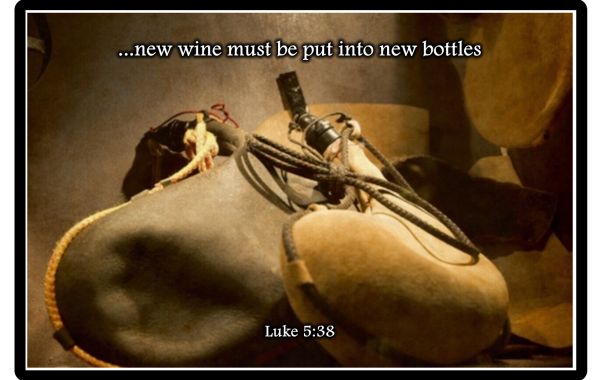And he spake also a parable unto them; No man putteth a piece of a new garment upon an old; if otherwise, then both the new maketh a rent, and the piece that was taken out of the new agreeth not with the old. And no man putteth new wine into old bottles; else the new wine will burst the bottles, and be spilled, and the bottles shall perish. But new wine must be put into new bottles; and both are preserved.
Jesus starts with common, everyday things and then takes the people from the everyday truths they easily understand to eternal truths the need to understand, from a physical reality to the spiritual lesson.
This is how a parable works. It takes an earthly story and then teaches a heavenly truth. And no one was better at it than Jesus. Parables weren’t new, the Greek philosophers used them all the time, but no one remembers any of their parable and most of forgotten the names of the philosophers, but even in our neo-pagan world people still know the parable of the prodigal son or the good Samaritan. They parables are part of the foundation of our society, or at least they used to be and should still be. So let us take some time and examine this story.
1st Parable - New Patches Don’t work on Old Clothes. Jesus says you can’t take a piece of new cloth and sew it on an old garment because you would ruin both.
Now this takes place in the times before pre-washed jeans and synthetic cloth that doesn’t shrink. But in Jesus’ day when cloth was made by hand from wool or linen. If you had an old piece of clothing and it torn you wouldn’t patch it with new cloth because the new cloth would draw up and shrink when it was washed while the old would not. This could tear the cloth and make the original tear even worse.
Jesus is telling the Pharisees, “You can’t take what I am giving and use it to try and repair what you have. The new will only tear up the old leaving both the new and the old useless.”
2nd Parable New Wine Doesn’t Go in Old Wineskins - Next Jesus says, “No man puts new wine into old bottles, because the new wine would burst the bottles and everything both wine and bottles would be lost.”
The bottles Jesus is talking about were goatskins. The goat skin was cleaned and tanned, then the leg tied off and a spout put in the neck forming a bottle. Back then though, these bottles, goatskins used for transporting wine, especially new wine, which is unfermented wine, in other words grape juice.
If you had to carry new wine, which was any less than 40 days old, you had to use a new wine skin. The new wine if put in an old goatskin would come in contact with residue of the yeast of the old wine left in the goatskin and begin to ferment. The old skin would then burst. New wine was carried in new wineskins, new bottles so it would not ferment, burst the skin and destroy the shipment.
Jesus was trying to tell the Pharisees you can’t take the New of who I am, and what I teach and put it in with the old of Judaism and the Law. The new life of Christ will not work with the old life of sin. The new way of Christ will not work with the old ways of tradition. The new relationship in Jesus will not work with the old rituals.
Are You Really Ready of Jesus’ New Life?
When you read scripture, do you place yourself in the story? You should, of course, because no other book is like the Bible. No other book is supernatural, and no other book was written by God’s direction specifically to you. So, If you placed yourself in this story would you be at the feast with a bunch of sinners and thieves or would you be on the street outside the home whispering about a preacher being in there with all those sinners?
We can see that Jesus didn’t fit the old perceptions and the old ways of the Pharisees.
We understand that but our problem is that we too often think He does fit into our perceptions and ways. What Jesus does in us and to us through salvation is shocking, overpowering and incomprehensible. It is anything but understandable to our human minds, possible to our human hearts or doable in our human strength. Yet that is what we often what we try and make it into.
We try to take who Jesus is and what Jesus does and make it all fit into our old life and our old way of thinking. But, it can’t be done. Jesus just told us so. Just like the old garment and the old wineskins it will tear us up. Jesus didn’t come to repair Judaism, he came to replace it. Jesus didn’t come to patch up your past, He came to give you a new future.
At the end of the Bible in Revelation 21:5, Jesus sums up what he did in time, history, the new creation and in new lives. He says, “Behold, I make all things new. And he said unto me, Write: for these words are true and faithful.”
Jesus brings the new to all of my life. He brings it at salvation, and he brings it to us every time we need it. Our challenge is to learn and walk in this truth and then find the power and the hope of the declaration of Jesus, “Behold, I make all things new!”
But many lives are ruined because they want the power and hope of the new life, but they want to put it in the wineskin of their old life, and it can’t be done. They want the love of Christ to just put a patch on the gaping holes of their old life instead of putting on the new garment of His righteousness. Such attempts can only result in empty lives and broken hearts.
It’s true of our lives and its true of our families. The attempt to protect your family with a little inoculation of church once a week won’t work. In fact, and you know this it will only ruin your family and ruin the church for your family. Both will be ruined, just as Jesus said.
Many churches are also trying to fit new patches to old garments or new wine in old wine skins. It won’t work. You can’t take the Gospel and put it into a Star Wars or Indiana Jones presentation for lost people and then expect them to be changed from by that watered down, worldly, wasted word. Nor can you expect a church to seek the power of Jesus’ new hope but bury it in our old traditions and expectations.







